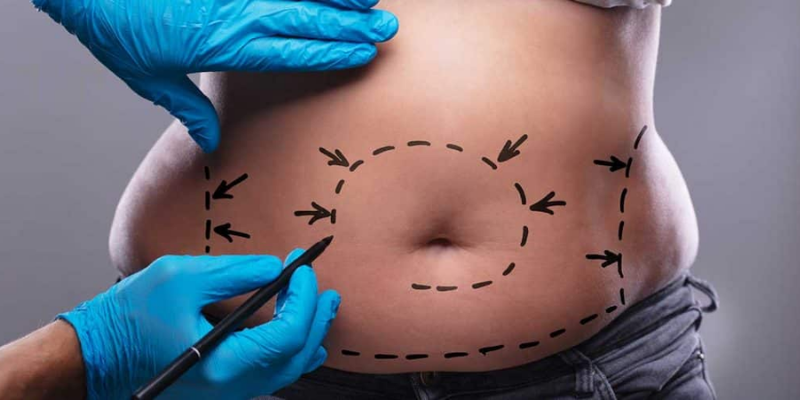Gastric Sleeve Weight Loss
When a patient does not have a hormonal issue, the strategy used for gastric sleeve weight loss is equally applicable to those who have failed to lose weight with food and exercise. Only millimeter-sized holes are needed for gastric tube surgery since it is done laparoscopically. There is little discomfort after surgery, and the end outcome is stunning. Three days following the procedure, the patient is able to get up and walkabout. So, it returns to its previous state after a period of 6–7 days. After sleeve gastrectomy surgery, weight gain might occur again if the tube becomes enlarged. To minimize side effects, patients should restrict their meal consumption after surgery.
However, if the patient is fed fluids and high-calorie meals, the surgery’s impact is diminished. Patients lose 65 to 70% of their body weight in the first year or two, but if they don’t alter their eating and drinking habits, they will recover 5 to 25% of the weight they lost in that time frame. Surgery on the gastric tube and other obesity-related procedures like BPD/DS may be carried out after such a circumstance. Before the 1.5-hour surgery, the patient should be educated and a nutritionist’s plan should be put up for the patient to follow. A psychologist should follow up with the patient so that the patient is less influenced by the psychological scenario that he or she may face.
The patient is ready for surgery after receiving the essential information from the surgeon and dietician, as well as the necessary psychological support. In cases when the patient does not comprehend the procedure or how it is performed, he continues to eat and drink in an effort to expand his stomach’s capacity.
Gastric Sleeve Weight Loss Process
As a result, he may have symptoms such as nausea and vomiting. As a result, the most critical realization for the patient is that his life would be drastically altered as a result of the procedure. Due to anatomical and functional changes, patients may readily adjust to a decreased appetite and limited food and beverage intake. The convex portion of the stomach secretes the majority of the ghrelin hormone, making it a key element in digestion. This component is surgically remove during the procedure, resulting in a considerable reduction in hormone levels in the blood. As a result, the pace of food intake decreases, and the sense of satiation rises, which helps to reduce hunger. A nutritionist will oversee a one-month post-surgery phase of dietary modification.
He is unable to undergo anesthesia because of complications with his digestive system. Those who have had previous gastric sleeve procedures are advise against doing so. Gastric sleeve surgery has a success rate of 60% in the treatment of obesity. The operation has no long-term side effects, and weight loss is not a concern as long as the patient follows a sensible diet. While in the other situation, he may face major nutritional issues as well as the potential for fast weight gain. First and second year patients should avoid fasting since they should not be hungry. Having gastric reduction surgery need follow-up care and attention.
Gastric Sleeve Weight Loss Procedure
This is due to the fact that the weight loss and water loss are both accelerating. There are also nutritional issues to contend with. Fasting may finish after the first two years if the patient so desires and the doctor so approves; nevertheless, the patient should not cease drinking appropriate water and fluids for the duration of his/her post-operative life. He/she should. As a result of the procedure, patients with persistent diabetes and insulin resistance may suffer abrupt drops or unexpected spikes.
Sleeve gastrectomy surgery, as it is more generally referring as, is a surgical treatment that reduces the size of the stomach. Some things should consider concerning stomach reduction surgery notwithstanding common misunderstandings. This method, which is often using in bariatric surgery, may save a patient’s life if they are very obese. Gastric sleeve surgery has become increasingly frequent in recent years, and it may use as a preventative therapy in the right patients. A person’s body mass index (BMI) is using to determine whether or not he or she qualifies as obese. You should have this operation done in order to avoid health issues that may arise as a consequence of obesity. Excess weight may cause a variety of health issues, including the following:
- The condition known as sleep apnea happens when a person repeatedly stops breathing while they are asleep.
- Diabetes mellitus type 2 with insulin insensitivity
- disease of the heart and blood vessels,
- Increased risk of heart disease due to deterioration of the vascular system.
- Due to the weight of the body, bones and joints are straining.
Gastric Sleeve Weight Loss Review
Inquiring minds want to know who can benefit from sleeve gastrectomy surgery. Stomach reduction surgery has some of the same dangers as other surgical procedures. Life-saving surgery may perform if a patient meets all of the necessary criteria. Even though every patient’s situation is unique, there are those who fit the ideal candidate profile for gastric sleeve surgery. It is consider morbidly obese if a person’s BMI is more than 40 kg/m2. Sleeve gastrectomy surgery is an option for these individuals.
People with a BMI of 35-40kg/m2 and a lifespan of 30 to 45 years are at a higher risk of experiencing negative effects. Sleeve gastrectomy surgery is an option if a person’s excessive weight is affecting their quality of life. Weight loss surgery, such as gastric sleeve surgery, may help individuals with conditions including hypertension and diabetes improve their quality of life.
Finally, sleeve gastrectomy surgery may finish on anybody, regardless of age, however it is not recommending for those under the age of 18. However, in life-threatening conditions, it may finish with parental permission. The elderly are also screening for surgical risk factors, as are those under the age of 65. So, endoscopic gastric balloon surgery may also advise to patients who are at risk of metabolic abnormalities and who are unable to adjust to bariatric surgery.
Can U Gain Weight After Gastric Sleeve Surgery for Weight Loss?
Whether can u gain weight after gastric sleeve’s answer is yes. It is possible to gain weight after gastric sleeve surgery for weight loss. This is because the procedure does not stop you from eating unhealthy foods or overeating. You will still be able to consume large amounts of food, but your stomach size has been reduced so you may not be able to eat as much as before. To prevent weight gain after gastric sleeve weight loss surgery, it is important to make lifestyle changes such as avoiding processed and high-calorie foods, limiting portion sizes, and exercising regularly. Additionally, monitoring your food intake and maintaining healthy eating habits can help you achieve long-term health goals such as maintaining healthy body weight.
Keeping these tips in mind can help you successfully manage any changes that may occur after the procedure and support your overall health goals. Seeing a doctor or dietitian who specializes in bariatric weight loss surgery or nutrition can also provide guidance on how best to adjust your diet in order to ensure optimal health outcomes post-surgery. You can also ask “can u gain weight after gastric sleeve?” to your doctor.
How Much is Gastric Sleeve Surgery, and Can the Cost be Manageable?
Gastric sleeve surgery, also known as sleeve gastrectomy, is a weight loss surgery that helps people who are struggling with obesity to lose weight. The procedure involves removing part of the stomach, and reducing the amount of food consumed at one time. The response to ‘how much is gastric sleeve surgery and the fee’s manageability?’ can vary significantly depending on your circumstances. It is essential to understand that a gastric sleeve weight loss treatment can be expensive and may not be covered by insurance. In addition, additional costs may be associated with sleeve gastrectomy pre-operative tests, post-operative care, and follow-up visits. Thus, getting an answer to “how much does gastric sleeve cost?” over the internet is almost impossible.

If you are considering gastric sleeve surgery but are concerned about the answer to “how much is gastric sleeve surgery?” there are several ways to help manage the expense. Some hospitals offer financing options for those who cannot afford to pay for the procedure upfront. Additionally, some surgeons offer payment plans for patients who cannot simultaneously pay for the entire procedure. By researching financing options and working with your doctor or hospital to find a plan that works for you, you can get the help you need.



